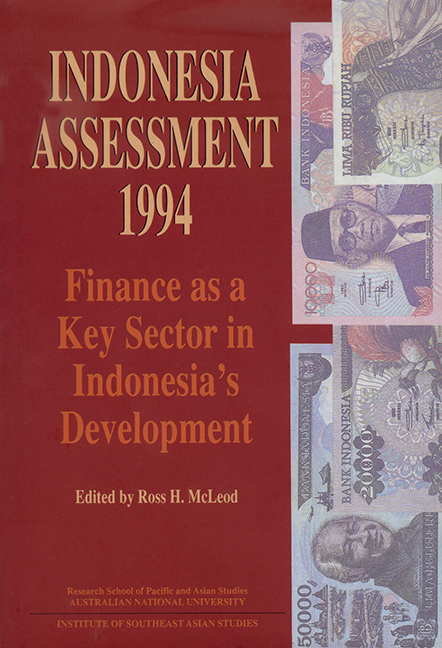Book contents
- Frontmatter
- Contents
- Tables, figures, appendices
- Foreword
- Glossary
- Contributors
- Acknowledgements
- 1 Introduction
- PART A ECONOMIC AND POLITICAL DEVELOPMENTS
- PART B FINANCE AS A KEY SECTOR IN INDONESIA'S DEVELOPMENT
- I The Reform Process
- 4 Financial reform: achievements, problems and prospects
- 5 Comments on Professor Wardhana's paper
- 6 The sequencing of economic deregulation in Indonesia
- II Monetary and Exchange Rate Policy
- III Banking Sector Reforms
- IV Domestic and International Capital Markets
- V Small-scale Finance
- References
- Index
6 - The sequencing of economic deregulation in Indonesia
from I - The Reform Process
Published online by Cambridge University Press: 21 October 2015
- Frontmatter
- Contents
- Tables, figures, appendices
- Foreword
- Glossary
- Contributors
- Acknowledgements
- 1 Introduction
- PART A ECONOMIC AND POLITICAL DEVELOPMENTS
- PART B FINANCE AS A KEY SECTOR IN INDONESIA'S DEVELOPMENT
- I The Reform Process
- 4 Financial reform: achievements, problems and prospects
- 5 Comments on Professor Wardhana's paper
- 6 The sequencing of economic deregulation in Indonesia
- II Monetary and Exchange Rate Policy
- III Banking Sector Reforms
- IV Domestic and International Capital Markets
- V Small-scale Finance
- References
- Index
Summary
Many economists have argued that if the government of a country with a tightly regulated economy undertakes a large-scale process of deregulation, then the sequence in which regulations are relaxed is important. Two propositions are so widely accepted that they are referred to here as the ‘orthodox view’. The first is that in a country in which there is rapid inflation because a substantial budget deficit is being financed by money creation, the relaxation of controls on capital outflow, or on domestic financial markets, can lead to an acceleration of inflation; and since the avoidance of hyperinflation appears to be a precondition for the success of any other reforms, the relaxation of these controls may actually be harmful, unless it is preceded by fiscal reforms which reduce the role of inflationary finance to relative insignificance. The second ‘orthodox’ proposition is that controls on international capital inflow should not be removed until after the completion of most other major reforms, including the liberalisation of controls on imports and exports, and the deregulation of the domestic financial sector. Although it is widely accepted, some economists have disputed this second proposition; for example, in their survey of Indonesia's financial development, Cole and Slade (1992) suggest that ‘an open capital account both incites and requires good macroeconomic management.’ Their conclusion is that if, as in Indonesia, the country is capable of ‘reasonably sound macro policies’, then early deregulation of the capital account may be optimal.
This chapter begins by summarising and appraising the theoretical analysis and empirical evidence used in support of the orthodox propositions. It then summarises Indonesia's experience with economic deregulation. The last section collects together the earlier results to answer two central questions: are the orthodox propositions on sequencing correct, and is Indonesia's experience consistent with them?
Is macroeconomic stability a pre-requisite for the success of all other reforms?
- Type
- Chapter
- Information
- Indonesia Assessment 1994Finance as a Key Sector in Indonesia's Development, pp. 101 - 117Publisher: ISEAS–Yusof Ishak InstitutePrint publication year: 1994

